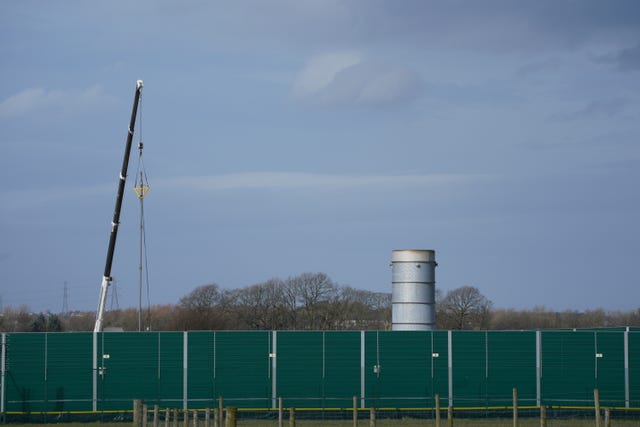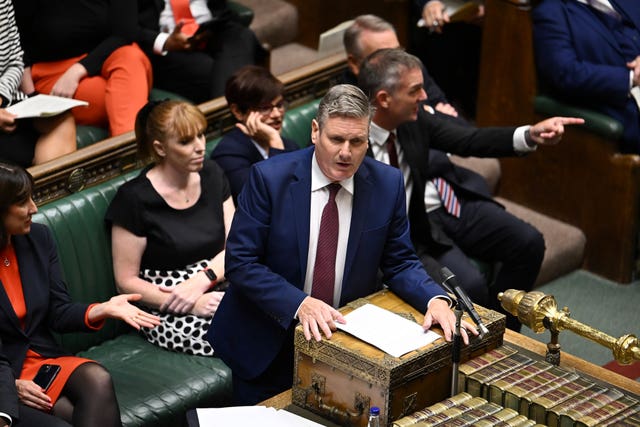Liz Truss is reportedly set to announce she is scrapping the ban on fracking as she unveils her long-awaited plan to guard Britons against crippling costs while boosting the country’s energy security.
The new premier is expected to tell MPs on Thursday that domestic energy bills will be frozen at around £2,500 as part of a package to ease the cost-of-living crunch – said to cost up to £150 billion.
The Times suggested the freeze could last for up to two years – until the next general election in 2024 – and would be funded by increased borrowing.

Ms Truss will also declare she is lifting the moratorium on fracking, according to reports, with potential for the change to be implemented at pace.
She is tipped to follow through on her leadership vow to end opposition to shale gas extraction in places where it is backed by local communities.
Meanwhile, the new PM will also confirm she is scrapping green levies on energy bills and declare her support for more North Sea drilling, The Daily Telegraph said.
Labour pointed to prior comments from then-business secretary Kwasi Kwarteng arguing that those calling for the return of onshore fracking “misunderstand the situation we find ourselves in”.

In March, Mr Kwarteng – now Chancellor – wrote in The Mail on Sunday: “Even if we lifted the fracking moratorium tomorrow, it would take up to a decade to extract sufficient volumes – and it would come at a high cost for communities and our precious countryside.
“No amount of shale gas from hundreds of wells dotted across rural England would be enough to lower the European price any time soon.
“And with the best will in the world, private companies are not going to sell the shale gas they produce to UK consumers below the market price. They are not charities, after all.”
Labour has also accused the PM of writing a “blank cheque” to oil and gas giants by ruling out a windfall tax to pay for the cost-of-living package, with the British people left to “foot the bill”.
As your Prime Minister, I am confident that together we can ride out the storm, rebuild our economy and become the modern, brilliant Britain that I know we can be.
I will take action every day to make that happen 🇬🇧 pic.twitter.com/1Moqm3cSwu
— Liz Truss (@trussliz) September 6, 2022
Ahead of Thursday’s announcement, Ms Truss acknowledged families and businesses across the country are concerned about how they will “make ends meet” over the coming months.
She blamed rising global prices on Russian president Vladimir Putin’s war in Ukraine and “weaponisation” of gas supply in Europe.
“This has only made clearer that we must boost our long-term energy security and supply,” she said.
“We will take action immediately to help people and businesses with bills but also take decisive action to tackle the root cause of these problems, so that we are not in this position again.
“We will set out our plans to deliver on that promise and build a prosperous Britain for everyone.”

Downing Street said the new PM would set out a “bold plan of action to support people across the UK” while also “ramping up domestic energy supply”.
Going head-to-head with Sir Keir Starmer at her first Prime Minister’s Questions, Ms Truss confirmed she would make an announcement on her cost-of-living proposals to the House on Thursday.
However, she faced accusations she was dodging scrutiny over the way her plans would be presented to Parliament.
She will open a debate on energy costs but, unlike a formal ministerial statement, this will not result in sustained questioning from MPs about the move.
Labour said the “only fair” answer to the crisis is its own proposal to freeze bills, valued by the party at £29 billion.
Shadow climate change secretary Ed Miliband argued that “core” to any solution is the question of “who pays”.

“By ruling out a windfall tax, Liz Truss, in one of her first acts as Prime Minister, has written a blank cheque to the oil and gas giants making £170 billion in excess profits, and the British people will foot the bill,” he said.
“Every penny her Government refuses to raise in windfall taxes is money that they will be loading onto the British people for years to come.”
The Times also reported that ministers are planning a public information campaign to encourage people to reduce their energy use this winter, in case freezing prices removes the incentive to cut consumption.




Why are you making commenting on The National only available to subscribers?
We know there are thousands of National readers who want to debate, argue and go back and forth in the comments section of our stories. We’ve got the most informed readers in Scotland, asking each other the big questions about the future of our country.
Unfortunately, though, these important debates are being spoiled by a vocal minority of trolls who aren’t really interested in the issues, try to derail the conversations, register under fake names, and post vile abuse.
So that’s why we’ve decided to make the ability to comment only available to our paying subscribers. That way, all the trolls who post abuse on our website will have to pay if they want to join the debate – and risk a permanent ban from the account that they subscribe with.
The conversation will go back to what it should be about – people who care passionately about the issues, but disagree constructively on what we should do about them. Let’s get that debate started!
Callum Baird, Editor of The National
Comments: Our rules
We want our comments to be a lively and valuable part of our community - a place where readers can debate and engage with the most important local issues. The ability to comment on our stories is a privilege, not a right, however, and that privilege may be withdrawn if it is abused or misused.
Please report any comments that break our rules.
Read the rules here